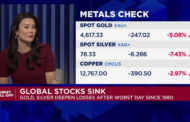By Guy Faulconbridge and Vladimir Soldatkin
MOSCOW (Reuters) -Saudi Arabia and Russia, the world’s two biggest oil exporters, on Thursday called for all OPEC+ members to join an agreement on output cuts for the good of the global economy just days after a fractious meeting of the producers’ club.
Hours after Russian President Vladimir Putin went to Riyadh in a hastily arranged visit to meet Saudi Crown Prince Mohammed bin Salman, the Kremlin released a joint Russian-Saudi statement about the conclusion of their discussions.
The Organization of the Petroleum Exporting Countries, Russia and other allies agreed last week to new voluntary cuts of about 2.2 million barrels per day (bpd), led by Saudi Arabia and Russia rolling over their voluntary cuts of 1.3 million barrel per day (bpd).
“In the field of energy, the two sides commended the close cooperation between them and the successful efforts of the OPEC+ countries in enhancing the stability of global oil markets,” the statement released by the Kremlin said.
“They stressed the importance of continuing this cooperation, and the need for all participating countries to join to the OPEC+ agreement, in a way that serves the interests of producers and consumers and supports the growth of the global economy,” the statement, which was in Russian, added.
The Russian version used the word “join” while an English translation of the statement, also released by the Kremlin, used the word “adhere” to the OPEC+ agreement.
Saudi state news agency SPA said that the crown prince, known as MbS, and Putin had stressed in their meeting the need for OPEC+ members to commit to the group’s agreement.
Sources in the oil market said such an explicit public remark from the Kremlin and the kingdom about “joining” cuts appeared like a hint aimed at specific oil powers.
Putin will hold talks with Iranian President Ebrahim Raisi in Moscow on Thursday.
Mystery still surrounds Putin’s trip to Riyadh and Abu Dhabi, on which he was escorted by four Russian fighter jets, and it was not immediately clear what particular issue was so important for Putin to make a rare overseas trip.
The Kremlin said Putin and MbS also discussed the conflicts in Gaza, Ukraine and Yemen, the Iranian nuclear programme and deepening defence cooperation.
OPEC+
OPEC+, whose members pump more than 40% of the world’s oil, had to delay its meeting over disagreements about output with African producers, though some oil traders said they suspected a deeper schism inside the group.
After the producers decided to cut, oil prices fell to a five month low – a clear sign that the market had expected more forthright action from OPEC+.
Putin and MbS, who together control one-fifth of the oil pumped each day, were shown with smiles and engaging in an effusive handshake as Putin emerged from his car in the Saudi capital.
Both MbS, 38, and Putin, 71, want – and need – high prices for oil – the lifeblood of their economies. The question for both is how much of the burden each should take on to keep prices aloft – and how to verify the burden.
At the talks with MbS, Putin said that a planned visit by the prince to Russia had been changed at the last minute, prompting him to visit Riyadh.
“We awaited you in Moscow,” Putin told MbS with a smile.
“I know that events forced a correction to those plans but as I have already said nothing can prevent the development of our friendly relations.”
Putin then said: “But the next meeting should be in Moscow.”
The crown prince said through a Russian translator that he was of course ready to do that.
“Then we are agreed,” Putin said.
(Reporting by Reuters; Editing by Alexander Smith and Mark Potter)













